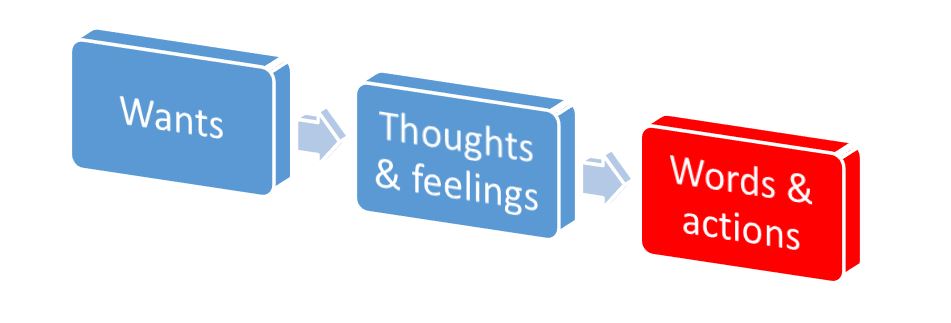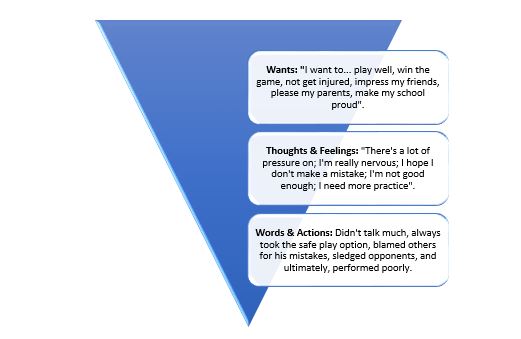Does your game crumble under high pressure? Are you hard on yourself when you make a mistake? Are you quick to blame others when everything is going wrong?
As the cliché goes “it’s the top two inches that counts”, which couldn’t be any truer when it comes to consistently performing at your best.
But developing your mental game is tough.
It takes time and considered work. You need to identify the important skills to learn and methods by which to do so, then practice deliberately to achieve mastery.
We spend hours doing this for the technical and tactical components of sport; however, much less time is spent on skills like motivation, confidence and self-awareness.
So, the question is: What are you doing to intentionally improve the mental skills of your sport?
Understanding Your Behaviours
In my recent interview with Helene Wilson, head coach of the Northern Mystics, I asked for her thoughts on the key characteristics that all young athletes need to develop.
“Self-awareness”, she said, without a second thought.
She went on explain the importance of being in control of change:
“The world we live in doesn’t teach us to look at ourselves; when things go wrong, too often we point the finger at someone else, rather than looking inwards and focusing on the things we can control. The reality in life is that we can’t change what everybody else is doing, we can only make changes ourselves if we want things to be different”.
And central to this change lies self-awareness.
It can be used to gain insight into why you behave the way you do and what to do to improve your performance.
Self-awareness can be broken down into three levels (Figure 1):
- The conative, which is comprised of wants;
- The cognitive and emotional, which is comprised of thoughts and feelings; and,
- The behavioural, which is comprised of words and actions.
Figure 1. The self-awareness ladder (Giges, 2014).

The crucial thing to understand here is that your behaviours are what other people see and therefore react to, even though they are dramatically influenced by your own thoughts, feelings and wants.
Therefore, changing your behaviours relies on being aware of what drives them.
A Real-Life Example
Imagine this scenario:
You’re a school basketballer on your way to the last game in regulation play for the season. You’re up against the top team who haven’t lost a game all year, and you need to win to make the finals. Oh, and it’s a home game, so all your classmates are going to be there to support.
 What are you thinking and feeling? What might your words and actions be during the warm up and once the game starts?
What are you thinking and feeling? What might your words and actions be during the warm up and once the game starts?
Now, think about what your wants are in this scenario, and how they might influence your behaviours.
Here’s how it played out for Ryan (name for privacy reasons) who went through this experience:

It’s clear that the pressure of the occasion overwhelmed Ryan, resulting in a lowered standard of performance.
But here’s the thing.
Ryan’s not alone.
Many youth athletes experience this type of pressure, which ends up affecting their game.
So what can you do about it then?
Using the Self-awareness Ladder to Improve Performance
The first thing to appreciate is that making mistakes when you’re new at something is normal.
In fact, it’s the best thing that can happen for your learning.
I’ve missed more than 9,000 shots in my career. I’ve lost more than 300 games. 26 times I’ve been trusted to take the game winning shot and missed. I’ve failed over and over and over again in my life. And that is why I succeed”.
Michael Jordan
Like improving your shot, the only way to improve your mental game is to go through adversity in the first place.
However, the crucial thing is that you learn from the experience, so that the next time you’re faced with a similar scenario you’re in a better position to cope.
And it starts by learning more about yourself.
What are your wants when it comes to your sport?
Furthermore, what are your wants in your school life, or when communicating with your parents?
What are your thoughts and feelings? And through your words and actions, how do you behave?
Document everything in a notebook.
Why write things down?
To remember it, of course. Because words on a page are a great starting point for action.
Spend a few minutes after every game, every practice, or whenever there is something you want to change, filling in your Ladder of Self-awareness.
Because only when you identify where things went wrong, can you work to change them.






































